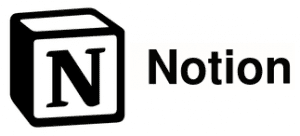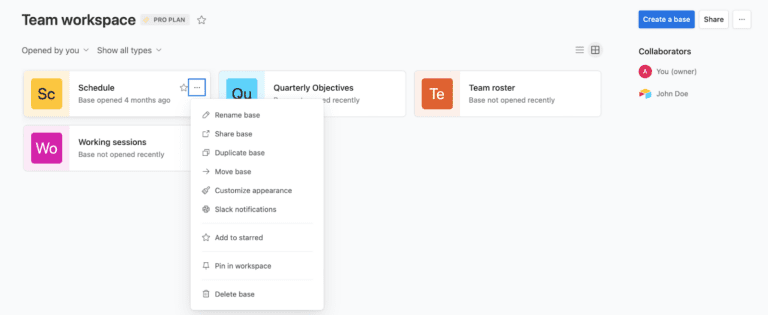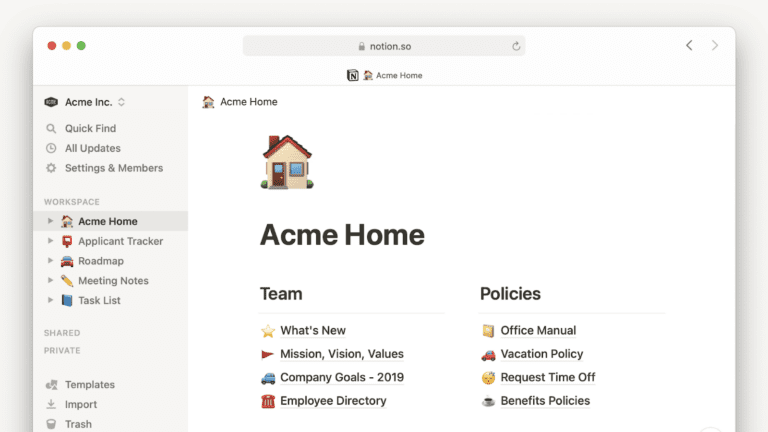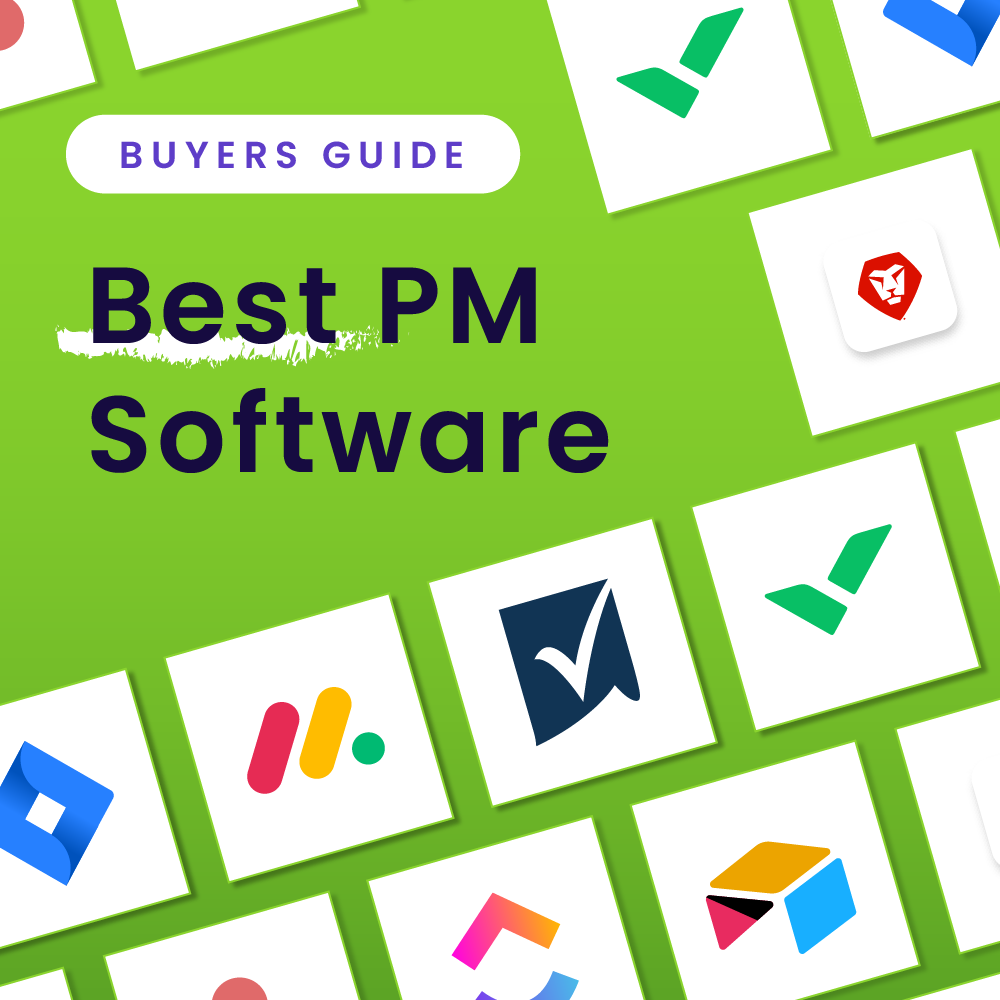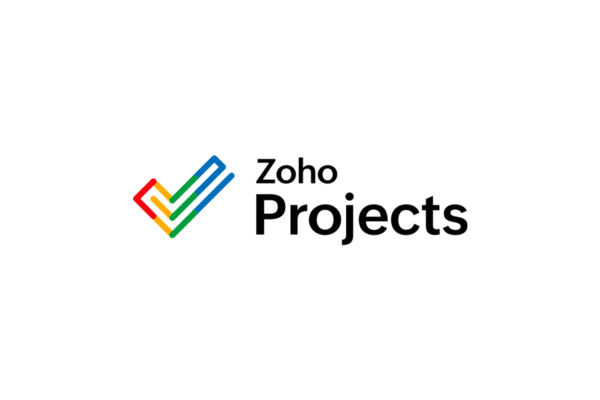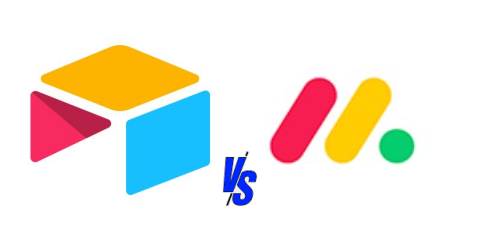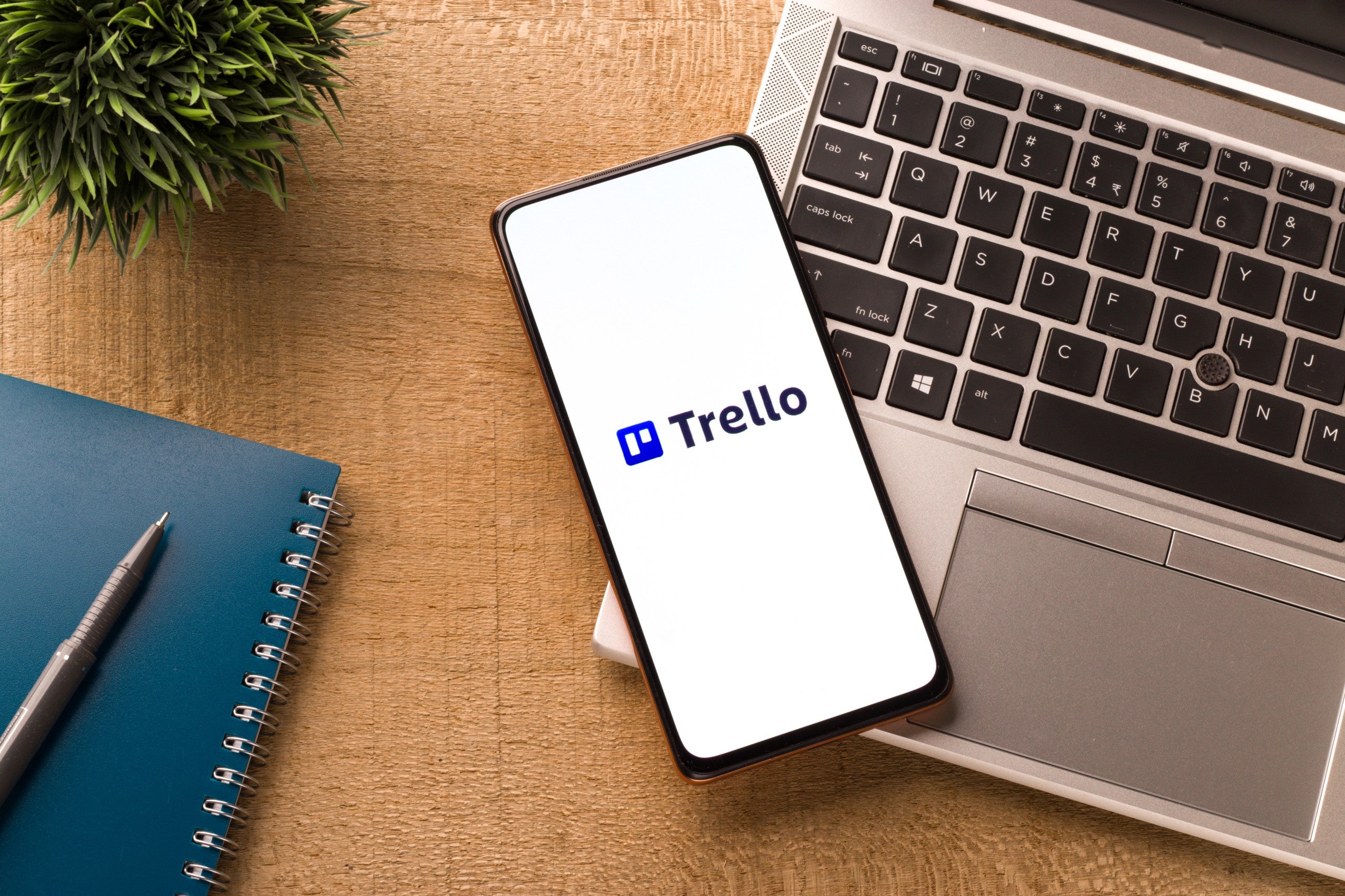When it comes to collaboration and project management, there isn’t a standardized solution that is perfect for every team. Since every organization has unique challenges, goals, and objectives, it’s critical to find the tool that meets your specific needs. Today, we’re comparing Airtable vs. Notion to see which is the better collaboration tool
project-management.com is free because select vendors may pay us for referrals. Our writers and editors are editorially independent, so we consider all vendors, even those who don’t pay us.
Airtable & Notion Compared
Originally designed for very different uses, Airtable and Notion have enough similarities that they can still be compared and contrasted against one another according to a number of key benchmarks. Before you can decide which one is right for you, it’s important to understand how each platform is used within a business or enterprise setting.
Despite their differences, there are enough similarities between the two that we can still compare Airtable and Notion side-by-side. While your preference ultimately comes down to your organizational needs, the benchmarks covered below are pretty standard for most comparable project management, productivity, and collaboration platforms on the market today.
Usability & Accessibility
Our Pick: Notion
Airtable and Notion are available for all modern operating systems that are currently in use on smartphones, laptops, and desktop PCs. These include Microsoft Windows, macOS, Android, and iOS.
However, Notion takes the lead with its web-based app. Although it doesn’t offer any additional functionality, it just gives users another option when it comes to accessing their program of choice. It also fits well with BYOD (Bring-Your-Own-Device) environments and those who regularly switch between operating systems or devices throughout the day.
Customer Service & Support
Our Pick: Notion
Notion is the clear winner when it comes to customer service and support. Although the entire range of Airtable subscriptions includes email support, there’s currently no telephone support included with any of their plans. Teams that subscribe to its Enterprise plan are given priority support, which could result in longer wait times for those with the Free, Pro, or Plus plans.
But Notion offers numerous ways to connect with customer support staff, including email, online chat, and telephone. Users can even direct their support questions to Notion’s official Twitter feed. Like Airtable, priority customer support is included with the Enterprise plan.
Airtable & Notion: Project Management Features Compared
Airtable and Notion are not project management (PM) platforms at their cores. However, both are usable in a wide variety of PM scenarios. Airtable and Notion even share some features commonly found in modern project management software solutions.
Team Collaboration
Our Pick: Airtable
Although they can be used by individuals, both Airtable and Notion were really designed with team collaboration in mind. It’s difficult to pick a winner in this category, but Airtable is preferable for several reasons.
- While Airtable’s free plan only supports a total of five commenters or editors, Airtable bases can be viewed by an unlimited number of users. Notion blocks, on the other hand, are only viewable by up to 10 guests without subscribing to a paid plan.
- Airtable’s free plan provides a two-week period for reviewing history and revisions, while Notion’s free plan only offers a one-week period. However, these trends reverse with the higher pricing tiers—ending with an unlimited period for Notion and a three-year limit for Airtable in their respective Enterprise plans.
- The ability to include 5GB attachments with Airtable’s free plan is great for collaboration on a small scale. Although Notion’s paid plans offer unlimited file uploads, most teams will have plenty of space with Airtable’s paid plans, too.
It’s almost too close to call, but the amount of collaboration that’s possible with Airtable’s free service is slightly ahead of Notion’s free plan.
Workflow & Data Visualizations
Our Pick: Airtable
Both Airtable and Notion have the ability to streamline your workflow and visualize data in different ways. They both support Gantt boards, Kanban charts, timelines, and a variety of additional perspectives.
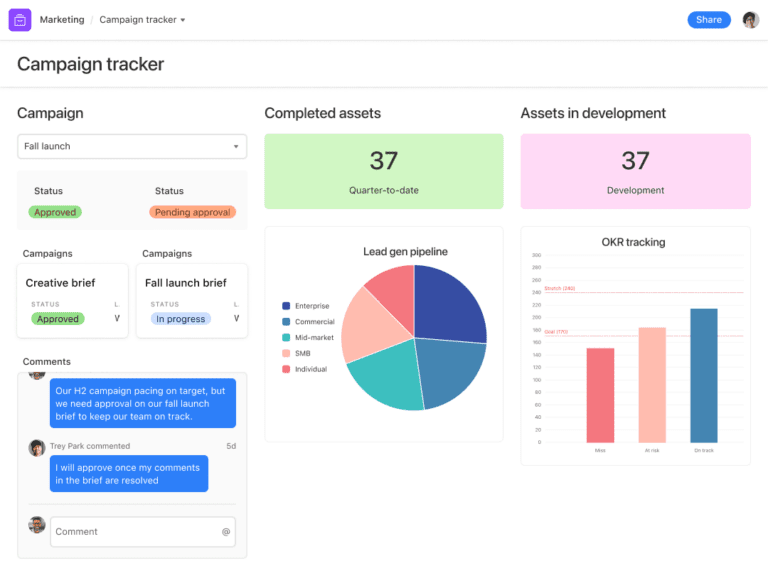
A Campaign tracker built in Airtable. Accessed 8/3/23
However, Airtable’s automations really set it apart from Notion in this category. Custom automations can be as simple as a single notification or as complex as needed—complete with multiple triggers, actions, and sequences. Not only does this improve and optimize your team’s day-to-day workflow, but it can also reduce the burden of individual teammates by automatically completing redundant tasks as needed.
Third-Party Integrations
Our Pick: Notion
Airtable features dozens of third-party integrations, including those for Slack, Gmail, Google Drive, Instagram, Salesforce, WordPress, Jira, Dropbox, and more. Third-party integrations are easy to install and readily available through Aiirtable’s website.
Likewise, Notion is also compatible with dozens of third-party apps, including many of the same ones listed above. Both Airtable and Notion also support Zapier, which adds the ability to connect with thousands of other third-party apps and services.
Teams who want the best of both worlds can use Airtable and Notion in conjunction with one another. Embedding an Airtable database into a Notion page lets you interact with your original database from the Notion platform, which is useful for those who are familiar with the Notion interface. As a result, Notion ranks slightly higher than Airtable for third-party integrations.
Airtable vs. Notion: Benefits & Pricing
Not only are Airtable and Notion both available through a free plan, but they both have similar paid subscription tiers, too. As expected, each progressive tier provides an increasing amount of functionality. In this way, both Airtable and Notion are able to fit into any organization’s budget.
Free Plans
Our Pick: Airtable
The free plans of both Airtable and Notion are meant for individuals and small teams. Although they offer limited functionality when compared to their paid plans, they’re often used to demo the features and functionality before committing to a long-term purchase. Depending on your exact needs, however, their respective free plans might be enough.
Airtable’s free plan includes:
- Unlimited bases with up to 1,200 records and 2GB of attachments per base
- Up to 1,200 records per individual table
- Support for five commenters or editors
- Unlimited commenters and read-only users
- Two-week revision history
Teams will also have access to Airtable’s selection of rich field types, which includes the ability to add file attachments, checkboxes, and dropdown menus into their bases as needed.
On the other hand, Notion’s free plan offers:
- Unlimited blocks for individuals with a limited block trial for small teams
- Support for up to 10 guests
- Basic page analytics
- One-week revision history
While the two platforms offer similar functionality in their free plans, Airtable’s support for unlimited commenters and read-only users gives it a slight edge over Notion.
Paid Plans
Our Pick: Notion
With a slightly more affordable pricing structure, Notion is our pick when it comes to paid service offerings. However, the difference is negligible if you’re in need of a specific feature that’s only available via Airtable.
Airtable
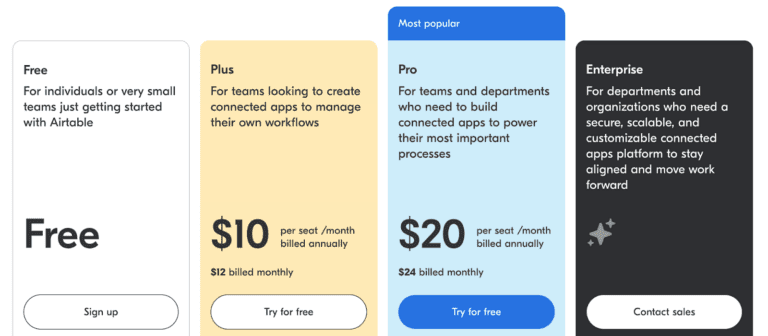
Airtable pricing. Accessed 8/3/23.
More suitable for large teams, Airtable offers a series of paid plans that provide an increasing level of functionality. Its most affordable plan increases the number of records per base to a total of 5,000, each of which supports 5GB of attachments. At this tier, base revisions and snapshot history are both increased to six months.
Larger teams and organizations can also opt for the Pro or Enterprise plans, which increase the numer of records per base to 50,000 or 250,000, respectively. Airtable’s Enterprise plan even keeps base revisions and snapshot history for a period of three years.
- Plus: $10 per user per month, when billed annually
- Pro: $20 per user per month, when billed annually
- Enterprise: Contact the Airtable team for a custom price quote
While Airtable’s pricing plans are certainly affordable, especially at the lower tiers, they’re priced slightly higher than the comparable plans with Notion.
Notion
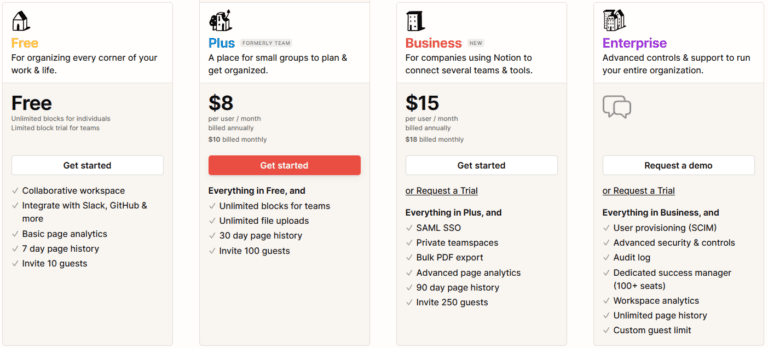
Noion pricing. Accessed 8/3/23.
Much like Airtable, Notion offers three pricing plans in addition to its free service. Again, each tier builds on top of the features and functionality included in the lower-priced tiers. Those who opt for the Enterprise plan will have access to everything Notion has to offer.
- Plus: $8 per user per month, when billed annually
- Business: $15 per user per month, when billed annually
- Enterprise: Contact Notion for a custom price quote
For an additional fee of $8 per user per month, organizations can utilize the Notion AI add-on with any of their subscription tiers, including the free plan. Notion AI automatically generates summaries and rewrites documents, and helps your team brainstorm ideas for new and upcoming projects.
The Bottom Line: Which is the Better Project Management Tool?
It’s a tie. While they were ultimately designed for two very different purposes, the versatility of both Airtable and Notion makes them an excellent fit in many different business and enterprise settings. Experienced project managers and skilled teams will find a fuller, more comprehensive project management solution in Airtable, but those who want simplicity and ease-of-use might find everything they need with Notion.
Looking for Airtable alternatives? Read our Rundown of your top options.

